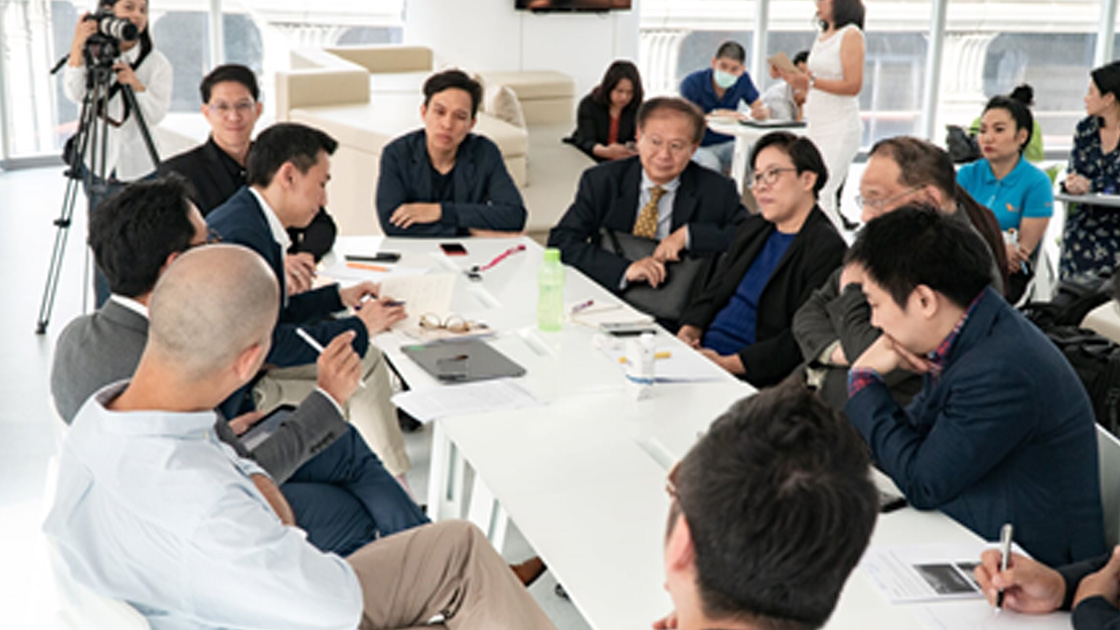ข่าวสาร

Mar 27, 2019 INNOVATION
ศูนย์วิจัยและนวัตกรรมเพื่อความยั่งยืน (RISC) ระดมสมองผู้เชี่ยวชาญจัดสัมมนา 2 เวที หาแนวทางแก้ไขปัญหามลภาวะ PM2.5
วันที่ 5 มีนาคม 2562, กรุงเทพฯ – ปัญหามลภาวะทางอากาศยังคงเป็นปัญหาใหญ่ที่มีผลต่อสุขภาวะของคนเมือง โดยเฉพาะในเขตกรุงเทพมหานครและปริมณฑล และได้ขยายวงกว้างไปยังหัวเมืองใหญ่ต่าง ๆ เช่นเชียงใหม่ และขอนแก่น นับว่าเป็น Urban Air Pollution หรือมลพิษทางอากาศ ศูนย์วิจัยและนวัตกรรมเพื่อความยั่งยืนหรือ RISC ภายใต้บริษัทแมกโนเลีย ควอลิตี้ ดีเวล็อปเม้นต์ คอร์ปอเรชั่น จำกัด (MQDC) ได้ตระหนักถึงคุณภาพชีวิต อีกทั้งให้ความสำคัญในการลดการสร้างและป้องกันมลภาวะทางอากาศ จึงได้ร่วมจัดเสวนา 2 เวทีเพื่อการออกแบบในการแก้ไขปัญหามลภาวะ PM2.5 ณ ศูนย์วิจัยและนวัตกรรมเพื่อความยั่งยืนหรือ RISC ชั้น 4 แมกโนเลียส์ ราชดำริ บูเลอวาร์ด
เวทีแรกเป็นความร่วมมือกันระหว่างสถาบันโลกร้อน มูลนิธินภามิตร (TGWA) กรมฝนหลวงและการบินเกษตร และศูนย์ RISC ในการจัดเวทีเสวนาสาธารณะ TGWA (Thai Global Warming Academy) ครั้งที่ 11 ภายใต้หัวข้อ “ข้อมูลใหม่ – มลพิษอากาศ PM2.5 ประเทศไทยเดือนมกราคม 2562” โดยวิทยากร 6 ท่านได้แก่ศาสตราจารย์ ดร. ธนวัฒน์ จารุพงษ์สกุล ประธานสถาบันโลกร้อนศึกษาประเทศไทย (TGWA) มูลนิธินภามิตร ผศ.ดร. สุรัตน์ บัวเลิศ คณบดีคณะสิ่งแวดล้อม มหาวิทยาลัยเกษตรศาสตร์ รศ.ดร. พิสุทธิ์ เพียรมนกุล กรรมการจัดทำยุทธศาสตร์ชาติด้านการสร้างการเติบโตบนคุณภาพชีวิตที่เป็นมิตรต่อสิ่งแวดล้อม รศ.ดร. สิงห์ อินทรชูโต หัวหน้าคณะที่ปรึกษาศูนย์ RISC และอาจารย์คณะสถาปัตยกรรมศาสตร์ มหาวิทยาลัยเกษตรศาสตร์ อาจารย์บุศราศิริ ธนะ ผู้เชี่ยวชาญอุตุนิยมวิทยา TGWA และดร. อัมรินทร์ ดรัณภพ ที่ปรึกษาบริษัทล็อกซเล่ย์ จำกัด (มหาชน)
โดยศาสตราจารย์ ดร. ธนวัฒน์กล่าวว่า “จากข้อมูลของสถานีตรวจวัดคุณภาพอากาศ กรมควบคุมมลพิษ ช่วงเวลา 19.00 ถึง 6 โมงเช้าจะมีปริมาณฝุ่นละอองมากที่สุด โดยเฉพาะช่วงวันหยุดเสาร์อาทิตย์ ซึ่งมีสาเหตุหลักมาจากพฤติกรรมของคนในแต่ละพื้นที่”
“รัฐบาลควรบรรจุโครงการแก้ไขปัญหามลพิษอากาศทั้งระบบของประเทศ เข้าสู่โครงการเร่งด่วนในแผนแม่บทยุทธศาสตร์ชาติทันที” ศาสตราจารย์ ดร. ธนวัฒน์กล่าว
ผศ.ดร. สุรัตน์ กล่าวว่า 4 แหล่งกำเนิดฝุ่นละออง PM2.5 ได้แก่ซัลเฟอร์ไดออกไซด์(SO2) ไนโตรเจนออกไซด์(NO2) ไฮโดรคาร์บอนที่เผาไหม้ไม่สมบูรณ์จากยานพาหนะ และความร้อนจากการจราจรทางถนน โดยสามารถแก้ปัญหาเบื้องต้นโดยการสร้างแนวต้นไม้ลึก 10 เมตร เพื่อกันเสียงและฝุ่นละออง อีกทั้งยังสร้างความแตกต่างของอุณหภุมิทำให้เกิดลมเพื่อทำให้ฝุ่นละอองลงสู่พื้น
รศ.ดร. สิงห์ กล่าวเสริมถึงความสำคัญของการวัดคุณภาพอากาศและมลภาวะฝุ่นละออง PM2.5 ที่มีผลต่อสุขภาวะสาธารณะ
“การติดตั้ง Weather Station ตามจุดต่าง ๆ มีความสำคัญต่อการรับรู้คุณภาพทางอากาศ เนื่องจากกรุงเทพฯมีตึกสูงจำนวนมาก การวัดคุณภาพอากาศตามระดับความสูงจึงเป็นปัจจัยที่ต้องคำนึงถึงในการสร้างตึกสูงและต้องมีการติดตั้งเครื่องฟอกอากาศภายในอาคาร อีกทั้งการปลูกต้นไม้ในพื้นที่ในเมืองเพื่อเพิ่มพี้นที่สีเขียวยังเป็นการสร้างคุณภาพอากาศที่ดีได้อีกด้วย” รศ.ดร. สิงห์ กล่าว
รศ.ดร. พิสุทธิ์ ได้เสนอโครงการด้านวิศวกรรมในการวัดคุณภาพและฝุ่นละอองทางอากาศ และโครงการการออกแบบผังเมืองที่สร้างการระบายอากาศที่ดี รวมถึงการสร้างเซนเซอร์ (Sensor) วัดคุณภาพอากาศเพื่อกระจายการตรวจวัดภายในพื้นที่ต่าง ๆ อีกด้วย
เวทีที่สองเป็นงานเสวนาเรื่องการออกแบบเพื่อแก้ไขปัญหามลภาวะ PM2.5 โดยรวบรวมผู้ร่วมเสวนาไว้ถึง 10 ท่านได้แก่ อาจารย์บุศราศิริ ธนะ ผู้เชี่ยวชาญอุตุนิยมวิทยา TGWA คุณยศพล บุญสม ภูมิสถาปนิก คุณอรรถพร คบคงสันติ ภูมิสถาปนิก หม่อมหลวงวรุตม์ วรวรรณ สถาปนิก รศ.ดร. สิงห์ อินทรชูโต หัวหน้าคณะที่ปรึกษาศูนย์ RISC และอาจารย์คณะสถาปัตยกรรมศาสตร์ มหาวิทยาลัยเกษตรศาสตร์หัวหน้าศูนย์สร้างสรรค์งานออกแบบเพื่อสิ่งแวดล้อม มหาวิทยาลัยเกษตรศาสตร์ คุณรัฐ เปลี่ยนสุข สถาปนิกและนักออกแบบ รศ.ดร. จิตติศักดิ์ ธรรมาภรณ์พิลาศ ภาควิชาการวางแผนและเมือง คณะสถาปัตยกรรมศาสตร์ จุฬาลงกรณ์มหาวิทยาลัย ดร. วสันต์ ภัทรอธิคม นักวิจัยอาวุโสและหัวหน้าห้องปฏิบัติการวิจัยระบบขนส่งและจราจรอัจฉริยะ NECTEC ดร. เจน ชาญณรงค์ กรรมการบริหาร บริษัทหาญ เอ็นจิเนียริ่ง โซลูชั่น จำกัด (มหาชน) และดร. อัมรินทร์ ตรัณภพ ที่ปรึกษา บริษัทล็อกซเล่ย์ จำกัด (มหาชน) ดำเนินรายการเสวนาโดยคุณเจรมัย พิทักษ์วงศ์ กรรมการผู้จัดการ บริษัทอมรินทร์พริ๊นติ้ง แอนด์ พับลิชชิ่ง จำกัด (มหาชน)
รศ.ดร. จิตติศักดิ์ กล่าวว่าควรมีองค์กรณ์หรือสถาบันที่เป็นเจ้าภาพในการวัดค่าฝุ่นละอองและดำเนินกรแก้ไขปัญหานี้อย่างเป็นทางการและมีประสิทธิภาพ ซึ่งการวัดค่าฝุ่นละอองทางแอพพลิเคชั่นนั้นยังให้ผลที่ไม่เสถียร
ดร. อัมรินทร์ ได้นำเสนอการวัดค่าฝุ่นละอองด้วยวิธีการ Dynamic Light Scattering (DLS) ซึ่งเป็นเทคนิคที่ใช้วัดขนาดของสารตัวอย่างในระดับนาโนเมตรตั้งแต่ 0.005 – 5 ไมโครเมตร สำหรับอนุภาคที่มีขนาดเล็กกว่า 5 ไมโครเมตรจะเกิดการแพร่กระจายอย่างไร้ทิศทางไปทั่วตัวกลาง
“อีกแหล่งสำคัญที่ทำให้เกิดฝุ่นละอองคือการกำจัดขยะโดยการนำมาเทบนพื้นที่ หรือ Landfill ซึ่งเป็นการฝังขยะแบบไม่กลบหน้าดิน จึงทำให้ฝุ่นละอองถูกพัดไปตามลม ก่อให้เกิดปัญหาเรื่องฝุ่น ทั้งนี้รัฐบาลจึงความมีการให้ความรู้ด้านการจัดขยะอย่างถูกต้องเพื่อป้องกันไม่ให้เกิดปัญหาดังกล่าว” ดร. อัมรินทร์ กล่าว
รศ.ดร. สิงห์ กล่าวว่า “ปัญหาฝุ่นละออง PM2.5 เป็นปัญหาที่มาจากแหล่งภายนอก สาเหตุของฝุ่นละอองเหล่านี้เกิดจากการคมนาคมภายในประเทศของเรา พฤติกรรมการใช้รถยนต์ การผลิตภาคอุตสาหกรรมของเรา นอกจากนี้เราควรให้ความสำคัญและเพิ่มพื้นที่สีเขียวภายในกรุงเทพฯให้มากขึ้น เพื่อการสร้างคุณภาพอากาศที่ดีให้กับเมืองของเรา”
ภายในงานยังได้มีการนำเสนอให้มีการสร้างพื้นที่สำหรับปลูกต้นไม้เพิ่มเป็น 12 เมตร (จากเดิม 6 เมตร) จากหน้าคอนโดมิเนียม และมีการแนะนำให้เพิ่มทางเดินเท้า และการใช้จักรยาน เพื่อลดปัญหาความหนาแน่นทางจราจร
การแก้ปัญหามลภาวะฝุ่นละออง PM2.5 จำเป็นต้องได้รับความร่วมมือทั้งจากภาครัฐบาลและเอกชน เพื่อทำให้ปัญหาฝุ่นละอองภายในประเทศได้รับการแก้ไขอย่างถูกต้อง ต่อเนื่อง และยั่งยืน
เวทีแรกเป็นความร่วมมือกันระหว่างสถาบันโลกร้อน มูลนิธินภามิตร (TGWA) กรมฝนหลวงและการบินเกษตร และศูนย์ RISC ในการจัดเวทีเสวนาสาธารณะ TGWA (Thai Global Warming Academy) ครั้งที่ 11 ภายใต้หัวข้อ “ข้อมูลใหม่ – มลพิษอากาศ PM2.5 ประเทศไทยเดือนมกราคม 2562” โดยวิทยากร 6 ท่านได้แก่ศาสตราจารย์ ดร. ธนวัฒน์ จารุพงษ์สกุล ประธานสถาบันโลกร้อนศึกษาประเทศไทย (TGWA) มูลนิธินภามิตร ผศ.ดร. สุรัตน์ บัวเลิศ คณบดีคณะสิ่งแวดล้อม มหาวิทยาลัยเกษตรศาสตร์ รศ.ดร. พิสุทธิ์ เพียรมนกุล กรรมการจัดทำยุทธศาสตร์ชาติด้านการสร้างการเติบโตบนคุณภาพชีวิตที่เป็นมิตรต่อสิ่งแวดล้อม รศ.ดร. สิงห์ อินทรชูโต หัวหน้าคณะที่ปรึกษาศูนย์ RISC และอาจารย์คณะสถาปัตยกรรมศาสตร์ มหาวิทยาลัยเกษตรศาสตร์ อาจารย์บุศราศิริ ธนะ ผู้เชี่ยวชาญอุตุนิยมวิทยา TGWA และดร. อัมรินทร์ ดรัณภพ ที่ปรึกษาบริษัทล็อกซเล่ย์ จำกัด (มหาชน)
โดยศาสตราจารย์ ดร. ธนวัฒน์กล่าวว่า “จากข้อมูลของสถานีตรวจวัดคุณภาพอากาศ กรมควบคุมมลพิษ ช่วงเวลา 19.00 ถึง 6 โมงเช้าจะมีปริมาณฝุ่นละอองมากที่สุด โดยเฉพาะช่วงวันหยุดเสาร์อาทิตย์ ซึ่งมีสาเหตุหลักมาจากพฤติกรรมของคนในแต่ละพื้นที่”
“รัฐบาลควรบรรจุโครงการแก้ไขปัญหามลพิษอากาศทั้งระบบของประเทศ เข้าสู่โครงการเร่งด่วนในแผนแม่บทยุทธศาสตร์ชาติทันที” ศาสตราจารย์ ดร. ธนวัฒน์กล่าว
ผศ.ดร. สุรัตน์ กล่าวว่า 4 แหล่งกำเนิดฝุ่นละออง PM2.5 ได้แก่ซัลเฟอร์ไดออกไซด์(SO2) ไนโตรเจนออกไซด์(NO2) ไฮโดรคาร์บอนที่เผาไหม้ไม่สมบูรณ์จากยานพาหนะ และความร้อนจากการจราจรทางถนน โดยสามารถแก้ปัญหาเบื้องต้นโดยการสร้างแนวต้นไม้ลึก 10 เมตร เพื่อกันเสียงและฝุ่นละออง อีกทั้งยังสร้างความแตกต่างของอุณหภุมิทำให้เกิดลมเพื่อทำให้ฝุ่นละอองลงสู่พื้น
รศ.ดร. สิงห์ กล่าวเสริมถึงความสำคัญของการวัดคุณภาพอากาศและมลภาวะฝุ่นละออง PM2.5 ที่มีผลต่อสุขภาวะสาธารณะ
“การติดตั้ง Weather Station ตามจุดต่าง ๆ มีความสำคัญต่อการรับรู้คุณภาพทางอากาศ เนื่องจากกรุงเทพฯมีตึกสูงจำนวนมาก การวัดคุณภาพอากาศตามระดับความสูงจึงเป็นปัจจัยที่ต้องคำนึงถึงในการสร้างตึกสูงและต้องมีการติดตั้งเครื่องฟอกอากาศภายในอาคาร อีกทั้งการปลูกต้นไม้ในพื้นที่ในเมืองเพื่อเพิ่มพี้นที่สีเขียวยังเป็นการสร้างคุณภาพอากาศที่ดีได้อีกด้วย” รศ.ดร. สิงห์ กล่าว
รศ.ดร. พิสุทธิ์ ได้เสนอโครงการด้านวิศวกรรมในการวัดคุณภาพและฝุ่นละอองทางอากาศ และโครงการการออกแบบผังเมืองที่สร้างการระบายอากาศที่ดี รวมถึงการสร้างเซนเซอร์ (Sensor) วัดคุณภาพอากาศเพื่อกระจายการตรวจวัดภายในพื้นที่ต่าง ๆ อีกด้วย
เวทีที่สองเป็นงานเสวนาเรื่องการออกแบบเพื่อแก้ไขปัญหามลภาวะ PM2.5 โดยรวบรวมผู้ร่วมเสวนาไว้ถึง 10 ท่านได้แก่ อาจารย์บุศราศิริ ธนะ ผู้เชี่ยวชาญอุตุนิยมวิทยา TGWA คุณยศพล บุญสม ภูมิสถาปนิก คุณอรรถพร คบคงสันติ ภูมิสถาปนิก หม่อมหลวงวรุตม์ วรวรรณ สถาปนิก รศ.ดร. สิงห์ อินทรชูโต หัวหน้าคณะที่ปรึกษาศูนย์ RISC และอาจารย์คณะสถาปัตยกรรมศาสตร์ มหาวิทยาลัยเกษตรศาสตร์หัวหน้าศูนย์สร้างสรรค์งานออกแบบเพื่อสิ่งแวดล้อม มหาวิทยาลัยเกษตรศาสตร์ คุณรัฐ เปลี่ยนสุข สถาปนิกและนักออกแบบ รศ.ดร. จิตติศักดิ์ ธรรมาภรณ์พิลาศ ภาควิชาการวางแผนและเมือง คณะสถาปัตยกรรมศาสตร์ จุฬาลงกรณ์มหาวิทยาลัย ดร. วสันต์ ภัทรอธิคม นักวิจัยอาวุโสและหัวหน้าห้องปฏิบัติการวิจัยระบบขนส่งและจราจรอัจฉริยะ NECTEC ดร. เจน ชาญณรงค์ กรรมการบริหาร บริษัทหาญ เอ็นจิเนียริ่ง โซลูชั่น จำกัด (มหาชน) และดร. อัมรินทร์ ตรัณภพ ที่ปรึกษา บริษัทล็อกซเล่ย์ จำกัด (มหาชน) ดำเนินรายการเสวนาโดยคุณเจรมัย พิทักษ์วงศ์ กรรมการผู้จัดการ บริษัทอมรินทร์พริ๊นติ้ง แอนด์ พับลิชชิ่ง จำกัด (มหาชน)
รศ.ดร. จิตติศักดิ์ กล่าวว่าควรมีองค์กรณ์หรือสถาบันที่เป็นเจ้าภาพในการวัดค่าฝุ่นละอองและดำเนินกรแก้ไขปัญหานี้อย่างเป็นทางการและมีประสิทธิภาพ ซึ่งการวัดค่าฝุ่นละอองทางแอพพลิเคชั่นนั้นยังให้ผลที่ไม่เสถียร
ดร. อัมรินทร์ ได้นำเสนอการวัดค่าฝุ่นละอองด้วยวิธีการ Dynamic Light Scattering (DLS) ซึ่งเป็นเทคนิคที่ใช้วัดขนาดของสารตัวอย่างในระดับนาโนเมตรตั้งแต่ 0.005 – 5 ไมโครเมตร สำหรับอนุภาคที่มีขนาดเล็กกว่า 5 ไมโครเมตรจะเกิดการแพร่กระจายอย่างไร้ทิศทางไปทั่วตัวกลาง
“อีกแหล่งสำคัญที่ทำให้เกิดฝุ่นละอองคือการกำจัดขยะโดยการนำมาเทบนพื้นที่ หรือ Landfill ซึ่งเป็นการฝังขยะแบบไม่กลบหน้าดิน จึงทำให้ฝุ่นละอองถูกพัดไปตามลม ก่อให้เกิดปัญหาเรื่องฝุ่น ทั้งนี้รัฐบาลจึงความมีการให้ความรู้ด้านการจัดขยะอย่างถูกต้องเพื่อป้องกันไม่ให้เกิดปัญหาดังกล่าว” ดร. อัมรินทร์ กล่าว
รศ.ดร. สิงห์ กล่าวว่า “ปัญหาฝุ่นละออง PM2.5 เป็นปัญหาที่มาจากแหล่งภายนอก สาเหตุของฝุ่นละอองเหล่านี้เกิดจากการคมนาคมภายในประเทศของเรา พฤติกรรมการใช้รถยนต์ การผลิตภาคอุตสาหกรรมของเรา นอกจากนี้เราควรให้ความสำคัญและเพิ่มพื้นที่สีเขียวภายในกรุงเทพฯให้มากขึ้น เพื่อการสร้างคุณภาพอากาศที่ดีให้กับเมืองของเรา”
ภายในงานยังได้มีการนำเสนอให้มีการสร้างพื้นที่สำหรับปลูกต้นไม้เพิ่มเป็น 12 เมตร (จากเดิม 6 เมตร) จากหน้าคอนโดมิเนียม และมีการแนะนำให้เพิ่มทางเดินเท้า และการใช้จักรยาน เพื่อลดปัญหาความหนาแน่นทางจราจร
การแก้ปัญหามลภาวะฝุ่นละออง PM2.5 จำเป็นต้องได้รับความร่วมมือทั้งจากภาครัฐบาลและเอกชน เพื่อทำให้ปัญหาฝุ่นละอองภายในประเทศได้รับการแก้ไขอย่างถูกต้อง ต่อเนื่อง และยั่งยืน
ศูนย์วิจัยและนวัตกรรมเพื่อความยั่งยืน (RISC)
บริษัท แมกโนเลีย ควอลิตี้ ดีเวล็อปเม้นต์ คอร์ปอเรชั่น จำกัด
เลขที่ 695 หมู่ที่ 12 ตำบลบางแก้ว อำเภอบางพลี จังหวัดสมุทรปราการ 10540
เวลาทำการ
วันจันทร์ – ศุกร์ | 11.00 – 17.00 น.
แผนที่ที่ตั้ง
ศูนย์บริการข้อมูลลูกค้า
1265
การเป็นสมาชิกของ RISC
ลงชื่อเข้าเป็นสมาชิกฟรี เพื่อรับสิทธิ์ในการใช้สิ่งอำนวยความสะดวกต่างๆ รวมทั้งห้องสมุด Eco-Material
เยี่ยมเยียนเราได้
ตั้งอยู่ที่โครงการมิกซ์ยูสแมกโนเลียส์ ราชดำริ บูเลอวาร์ด เพียงไม่กี่ก้าวจากรถไฟฟ้า
ผู้ผลิตผลิตภัณฑ์เพื่อสิ่งแวดล้อม
หากคุณเป็นผู้จัดทำผลิตภัณฑ์เพื่อสิ่งแวดล้อม เราพร้อมรับฟังไอเดียของคุณ
นักลงทุน และ นักศึกษา
RISC สนับสนุนนักเรียนนักศึกษา และคนรุ่นใหม่ไฟแรงในสาขาวิศวกรรม การออกแบบ และสถาปัตยกรรม